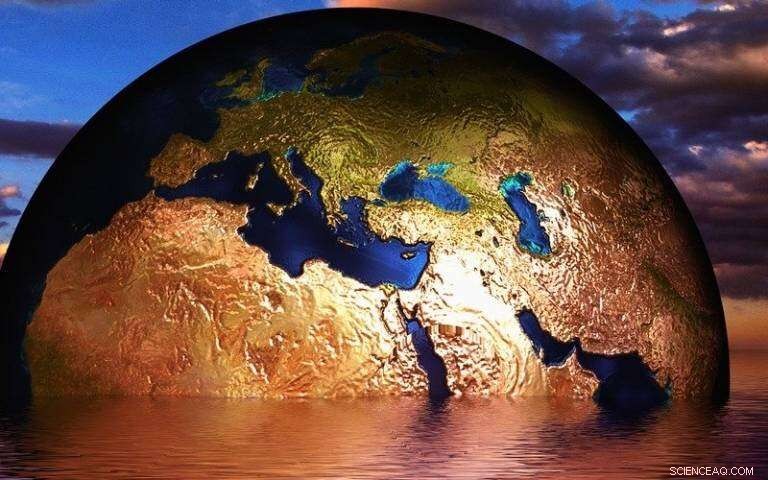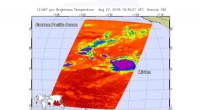Forskere advarer G7 om, at omkostningerne ved at overtræde 1,5˚C -varmegrænsen langt overstiger omkostningerne ved at nå den

Kredit:Gerd Altmann fra Pixabay
En gruppe af verdens førende klimaforskere opfordrer globale ledere til at tage hensyn til det økonomiske, miljømæssige og humanitære omkostninger ved ikke at holde den globale opvarmning under 1,5˚C i dette århundrede, i et træk ledet af eksperter fra UCL, University of Exeter og ICCCAD.
Da lederne for syv af verdens rigeste nationer mødes i Cornwall til G7 -topmødet, forskerne har lanceret et 1,5 graders charter for at fremhæve, hvordan brud på 1,5˚C -målet, der er skitseret i Parisaftalen, vil koste langt mere end at betale fattigere nationer for at hjælpe globale bestræbelser på at nå det.
Det er håbet regeringer, virksomheder og offentligheden vil stå bag chartret for at påvirke samtalen om klimafinansiering og styre centrale beslutninger truffet på det næste FN -klimatopmøde, COP26 i Glasgow i november.
De, der er mest sårbare over for klimakrisens følger, lever hovedsageligt i det globale syd, men de har bidraget mindst til drivhusgasemissioner. Charteret hævder, at at reducere emissionerne tilstrækkeligt, det vil kræve rigere lande at betale erstatning til fattigere lande. Beløbene skal rimeligt afspejle førstnævntes ansvar for krisen og sidstnævntes sårbarhed over for den.
Målet med chartret er derfor at fungere som en katalysator for at tilskynde velhavende nationer til at støtte de mindre velhavende til ikke kun at afkarbonisere, men også sikre, at de har råd til at iværksætte foranstaltninger til beskyttelse af deres hjem, job og lander fra klimarelaterede påvirkninger som ekstremt vejr, dårligt helbred, tab af job og fødevaresikkerhed.
For at støtte chartret, de involverede akademikere er ved at udvikle et globalt forskningsprojekt for fuldt ud at identificere og sammenligne omkostningerne ved at overstige en 1,5˚C temperaturstigning i forhold til de omkostninger, der allerede er forventet af dekarboniseringen, der kræves for at nå 1,5C -målet.
1.5˚C gradchartret opfordrer især regeringer til at:
- Anerkend de menneskelige og økonomiske omkostninger ved at overstige 1,5˚C, og at disse omkostninger vil blive afholdt uforholdsmæssigt rundt om i verden og af fremtidige generationer
- Lov om deres forpligtelse til at begrænse global opvarmning til 1,5˚C
- Tilskynde til udvikling af klimafinansieringsmekanismer, der forbinder omkostningerne ved at forsinke klimaindsatsen med omkostningerne ved dekarbonisering
Professor i Global Change Science ved UCL, Simon Lewis sagde:"Det her handler om at finde løsninger på klimakrisen, der legemliggør retfærdighed og opbygger tillid. Lavere indkomstlande skabte ikke dette problem, alligevel betaler de allerede for det med deres levebrød og i stigende grad deres liv. Det er op til dem, der har bidraget mest til problemet, at løse den uretfærdighed og opbygge tillid fremover. At løse klimakrisen betyder at anerkende den skade, der allerede er forårsaget, og foretage nye alternative planer og valg for at vende den tidevand.
"Det globale syd har hidtil været en lille del af problemet, men det er en kæmpe del af løsningen. Vi er nødt til at demonstrere, at menneskers sikkerhed og sikkerhed er en prioritet. Som med pandemien, ingen af os er i sikkerhed, før vi alle er i sikkerhed. Tilsvarende intet land kan fuldt ud beskytte mod virkningerne af klimaændringer, medmindre vi alle er beskyttet mod dem.
"At stabilisere vores klima kræver, at emissionerne falder til netto -nul. Men at bygge en velstående og modstandsdygtig verden vil kræve mere end det, det vil kræve at øge de fattiges indkomstmagt og foretage investeringer for at beskytte dem, der allerede lider mest uden egen skyld. "
Professor i jordsystemvidenskab ved UCL, Mark Maslin, said:" The science is clear—going beyond 1.5˚C will increase human misery around the world and put a huge financial burden on all of us. Our Charter calls on the governments of the world to invest in dealing with climate change now, which will not only increase people's health and well-being now but will save trillions of dollars.
"We call on everyone that cares about our planet to sign our Charter to show that citizens of the world want Governments, corporations and the wealthy to invest in dealing with climate change. The burden of saving our planet must fall on the wealthiest in our global society as they have contributed most to the problem through excessive consumption."
Professor Tim Lenton, Director of the Global Systems Institute at the University of Exeter said:""Global warming above 1.5C markedly increases the risk of crossing climate tipping points which will do greatest harm to the world's poorest. Multiple abrupt climate changes occur between 1.5˚C and 2˚C global warming in IPCC climate model runs. Going to 2˚C warming risks a collapse of the West Antarctic ice sheet that would accelerate sea-level rise and threaten low-lying islands and coastlines such as Bangladesh. It would also degrade essentially all tropical coral reefs on which many depend for their livelihoods."
"Going from 1.5˚C to 2˚C warming would put hundreds of millions of people—mostly in sub-Saharan Africa and the Indian subcontinent—outside of the climate 'niche' that supports high human population densities today and has done in the past. It would also greatly increase their exposure to life-threatening hot and humid climate extremes."
Professor Saleemul Huq, Director of the International Center for Climate Change and Development (ICCCAD) and Professor at the Independent University Bangladesh (IUB), said:"The concept of loss and damage from human induced climate change is closely connected to whether world leaders keep their commitment to remaining below 1.5 Degrees Centigrade or not. For every fraction of a Degree that the world goes above that threshold, the associated loss and damage will be exponentially worse and will fall mainly on the world's poorest communities in the poorest countries."
Professor Mizan Khan, Deputy Director of the International Center for Climate Change and Development (ICCCAD) and Program Director of Least Developed Countries University Consortium on Climate Change (LUCCC), said:"We already live in a climate-changed world of 1.2˚C degrees higher temperature relative to pre-industrial levels. But with no ambitious mitigation around, adaptation finance to support the most impacted communities is woefully poor. Against this, it is ironic that world military spending witnessed a hike, even in 2020, hitting the two trillion-dollar mark."
Ashish Ghadiali, Activist-in-Residence at UCL's Sarah Remond Center for the study of Racism and Racialisation and a member of the co-ordinating committee of the COP26 civil society coalition, said:"The G7's announcements around digital taxation point to an appetite for innovation in finance that now urgently needs to be applied to the task of delivering climate justice as we approach COP26. As COP president, the UK government currently talks about the objective of coming good on past commitments of $100 billion a year. But these are (broken) promises that were made 12 years ago in Copenhagen. In the time that's elapsed, we've seen the impacts of climate breakdown incur costs related to loss and damage alone in excess of $150 billion a year.
"With rising global temperatures, the costs of climate breakdown are escalating and will continue to do so. The burden of these costs will fall hardest on those living on the frontlines of climate breakdown—those whose lives are already the most precarious and who are least responsible for creating climate change. It will also fall on our children, and on our children's children unless, collectively, we're able to achieve what we're setting out to achieve with this 1.5˚C charter—a paradigm shift in how we perceive our collective responsibility to steer a path towards a sustainable future."
The scientists and academics involved in creating the Charter hope that governments and organizations around the world will back it and use it as a tool to inform public and policy debates on climate finance. The ultimate aim is to create an international climate justice research network, connecting institutions in the global north and south, addressing the limitations of current climate finance strategies and collaborating to replace them with fair, workable alternatives, before it is too late.
The 1.5˚C Degree Charter is hosted on the UCL Climate Hub website.
 Varme artikler
Varme artikler
-
 Det Røde Hav kan afkøles snarere end opvarmes, undersøgelse finderKAUST-forskere udfører detaljerede analyser af Rødehavsdata ved hjælp af KAUST Visualization Laboratory. Kredit:King Abdullah University of Science and Technology En nylig undersøgelse foretaget a
Det Røde Hav kan afkøles snarere end opvarmes, undersøgelse finderKAUST-forskere udfører detaljerede analyser af Rødehavsdata ved hjælp af KAUST Visualization Laboratory. Kredit:King Abdullah University of Science and Technology En nylig undersøgelse foretaget a -
 Ny model forbedrer forvaltningen af vådområder, flodslette og flodhabitaterUSU -forskere udviklede en model, der kan hjælpe med at forbedre vådområder og flodhabitater. Kredit:USU Vådområder, flodsletter og vandmiljøer er nogle af Utahs vigtigste økosystemer. De er hjems
Ny model forbedrer forvaltningen af vådområder, flodslette og flodhabitaterUSU -forskere udviklede en model, der kan hjælpe med at forbedre vådområder og flodhabitater. Kredit:USU Vådområder, flodsletter og vandmiljøer er nogle af Utahs vigtigste økosystemer. De er hjems -
 NASA finder kun en lille forbedring af Miriams strukturNASAs Aqua -satellit passerede Tropical Storm Miriam den 27. august kl. 06:35 EDT (1035 UTC). AIRS oplevede de koldeste skyhøjeste temperaturer (lilla) omkring sit cirkulationscenter. Kredit:NASA JPL/
NASA finder kun en lille forbedring af Miriams strukturNASAs Aqua -satellit passerede Tropical Storm Miriam den 27. august kl. 06:35 EDT (1035 UTC). AIRS oplevede de koldeste skyhøjeste temperaturer (lilla) omkring sit cirkulationscenter. Kredit:NASA JPL/ -
 Årsager til ekstremt vejr og klimahændelser i Kina i løbet af 2020/21Kredit:CC0 Public Domain I løbet af sommeren 2020, især juni og juli, perioder med ekstrem kraftig nedbør forekom i Kinas Yangtze River Valley (YRV). Disse regnhændelser forårsagede de alvorligste
Årsager til ekstremt vejr og klimahændelser i Kina i løbet af 2020/21Kredit:CC0 Public Domain I løbet af sommeren 2020, især juni og juli, perioder med ekstrem kraftig nedbør forekom i Kinas Yangtze River Valley (YRV). Disse regnhændelser forårsagede de alvorligste
- Arktis:vigtige ting at vide
- Med støtte, grafen stadig en overlegen termisk leder
- Ufuldkommenheder i grafen er nøglen til at skabe overfølsom elektronisk næse
- Termokemisk nanolitografi tillader nu flere kemikalier på en chip
- Vortex, nøglen til informationsbehandlingskapacitet:Virtuel fysisk reservoir-beregning
- Billede:Vulkangrave på Mars


